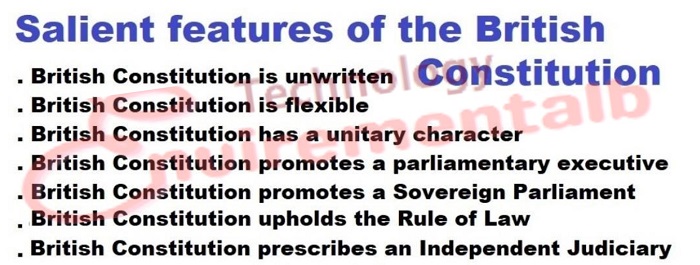The British Constitution is not a completely codified one, acts, conventions, certain rules, and regulations are considered constitutional documents. These documents determine the working of the country and impart certain features to this ‘unwritten’ constitution. Some of the most significant features are listed in the following sections: Some important salient features of British constitution are given below

British Constitution is unwritten
The most important feature of British constitution is unwritten character. There is no written document or precise, which may be called the British constitution. It was really this aspect of the British constitution that led De Tocqueville to remark that English constitution does not really exist. The main reason of this feature (unwritten constitution) is that it is based on political traditions and conventions and that is why its not consist on written documents. However, it has some written parts too which includes Parliamentary Statues, Historical Documents, , Judicial Decisions and Constitutional Characters.
The British Constitution keeps evolving with time
The British constitution is evolutionary its mean that it developed with the passage of time according to development. The constitution of England never framed by any constituent assembly. Non one can claim to be its other, No precise date of its birth can be given because it is the product of gradual growth and development. Its development is unbroken continuity of development over a period of more than thousand years. Its sources are several some time are accidental and some time by high designs according to development.
British Constitution is flexible
The British constitution is very flexible constitution. It can be passed, amended and repealed by simple majority of Parliament. Feature of flexibility depend on the virtue of adjustability and adaptability. This ability of british constitution enable it to grow with the passage of time and according to new requirements of society. So, due this it always full fill all requirements that are needed for the betterment of state and peoples.
British Constitution has a unitary character
The constitution of British has unitary character as opposed to a federal one. Powers of the British government are vested in the British Parliament, which is a sovereign body. The executive organs of state are subordinate to it and exercise delegated powers and are answerable to it. There is only one legislature. England, Scotland, Wales etc. are administrative units and not political autonomous units.
British Constitution promotes a parliamentary executive
The British government has parliamentary form.
England has a Parliamentary form of government. The King who is sovereign has been deprived of all his powers and authority. The real functionaries are Ministers who belongs to the majority party in Parliament and remain in office so long as they retain its confidence. The Prime Minister and his Ministers are responsible to the legislature for their acts and policies. In this system the executive and legislature are not separated as in the federal form of government
British Constitution promotes a Sovereign Parliament
Parliament is supreme and sovereign in the United Kingdom. Command of law is final no court in the state can challenge the validity of laws
Bicameralism
The parliament has two chambers House of looard and house of commend. The house of commons is the lower chamber of parliament that are directly connoted with the people. Its popular chambers whos member are directly elected by peoples of England. House of parliament is upper chambers. It is basically a hereditary chambers and its members are elected by the king/Queen.
British Constitution upholds the Rule of Law
Modern legal systems, same like British constitution, see the rule of law as a fundamental rights. The principles of the rule of law are:
- In the eyes of the law, everyone is equal and regardless.
- This theory emphasizes that the law, not any individual, is supreme.
- Without a fair and adequate trial by a competent court of law, no one can be imprisoned. No one can be punished by, liberty, or property unless there has been a specific breach of law proven in a regular court of law through a regular procedure.
British Constitution prescribes an Independent Judiciary
The Rule of Law in British constitution is protected by the fact that judges can only be removed from office for significant misconduct after a procedure both Houses of Parliament. As a result, the judges are free to make their decisions without any fear or favor.
Related Posts
- Essentials of a valid custom in jurisprudence
- Salient features of the British Constitution
- Custom as a Source of Law in jurisprudence
- Difference between law and morality in Jurisprudence
- Ijma in Islam | Importance of Ijma in Islamic
- Legislation- Types of Legislation in jurisprudence
- Types of Ownership in jurisprudence
- Different types of Possession in Jurisprudence
- What are the Basic Sources of Islamic Law or Sharia
- Relation of Jurisprudence with other social sciences
- Legislation- Types of Legislation in jurisprudence
Leave a Reply